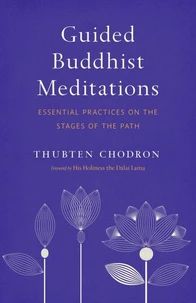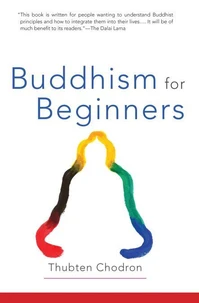Don't Believe Everything You Think. Living with Wisdom and Compassion
Par :Formats :
Disponible dans votre compte client Decitre ou Furet du Nord dès validation de votre commande. Le format ePub protégé est :
- Compatible avec une lecture sur My Vivlio (smartphone, tablette, ordinateur)
- Compatible avec une lecture sur liseuses Vivlio
- Pour les liseuses autres que Vivlio, vous devez utiliser le logiciel Adobe Digital Edition. Non compatible avec la lecture sur les liseuses Kindle, Remarkable et Sony
- Non compatible avec un achat hors France métropolitaine
 , qui est-ce ?
, qui est-ce ?Notre partenaire de plateforme de lecture numérique où vous retrouverez l'ensemble de vos ebooks gratuitement
Pour en savoir plus sur nos ebooks, consultez notre aide en ligne ici
- Nombre de pages256
- FormatePub
- ISBN978-0-8348-2838-4
- EAN9780834828384
- Date de parution08/01/2013
- Protection num.Adobe DRM
- Taille1 Mo
- Infos supplémentairesepub
- ÉditeurSnow Lion
Résumé
It can be hard for those of us living in the twenty-first century to see how fourteenth-century Buddhist teachings still apply. When you're trying to figure out which cell phone plan to buy or brooding about something someone wrote about you on Facebook, lines like "While the enemy of your own anger is unsubdued, though you conquer external foes, they will only increase" can seem a little obscure.
Thubten Chodron's illuminating explication of Togmay Zangpo's revered text, The Thirty-seven Practices of Bodhisattvas, doesn't just explain its profound meaning; in dozens of passages she lets her students and colleagues share first-person stories of the ways that its teachings have changed their lives. Some bear witness to dramatic transformations-making friends with an enemy prisoner-of-war, finding peace after the murder of a loved one-while others tell of smaller lessons, like waiting for something to happen or coping with a minor injury.
Thubten Chodron's illuminating explication of Togmay Zangpo's revered text, The Thirty-seven Practices of Bodhisattvas, doesn't just explain its profound meaning; in dozens of passages she lets her students and colleagues share first-person stories of the ways that its teachings have changed their lives. Some bear witness to dramatic transformations-making friends with an enemy prisoner-of-war, finding peace after the murder of a loved one-while others tell of smaller lessons, like waiting for something to happen or coping with a minor injury.
It can be hard for those of us living in the twenty-first century to see how fourteenth-century Buddhist teachings still apply. When you're trying to figure out which cell phone plan to buy or brooding about something someone wrote about you on Facebook, lines like "While the enemy of your own anger is unsubdued, though you conquer external foes, they will only increase" can seem a little obscure.
Thubten Chodron's illuminating explication of Togmay Zangpo's revered text, The Thirty-seven Practices of Bodhisattvas, doesn't just explain its profound meaning; in dozens of passages she lets her students and colleagues share first-person stories of the ways that its teachings have changed their lives. Some bear witness to dramatic transformations-making friends with an enemy prisoner-of-war, finding peace after the murder of a loved one-while others tell of smaller lessons, like waiting for something to happen or coping with a minor injury.
Thubten Chodron's illuminating explication of Togmay Zangpo's revered text, The Thirty-seven Practices of Bodhisattvas, doesn't just explain its profound meaning; in dozens of passages she lets her students and colleagues share first-person stories of the ways that its teachings have changed their lives. Some bear witness to dramatic transformations-making friends with an enemy prisoner-of-war, finding peace after the murder of a loved one-while others tell of smaller lessons, like waiting for something to happen or coping with a minor injury.














